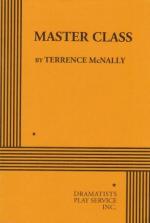|
This section contains 251 words (approx. 1 page at 400 words per page) |

|
Master Class Summary & Study Guide Description
Master Class Summary & Study Guide includes comprehensive information and analysis to help you understand the book. This study guide contains the following sections:
This detailed literature summary also contains Bibliography and a Free Quiz on Master Class by Terrence McNally.
Terrence McNally's Master Class was first produced by the Philadelphia Theatre Company in March 1995; it opened at the Golden Theatre in New York City in November of the same year. The play is based on a series of master classes given by the renowned opera singer Maria Callas at the Juilliard School of Music in New York in 1971 and 1972. Callas (1923-77), was the greatest dramatic soprano of her generation and also a controversial figure. Her restless and tempestuous personality often led her into disputes with opera managements and feuds with rival singers. However, she was adored by her fans and was the subject of constant media attention, including gossip about her jet-set life with the wealthy Greek ship owner Aristotle Onassis.
Although Master Class does delve into the triumphs and tragedies of Callas's life, its primary focus is the art of dramatic singing. As McNally's fictional version of Callas teaches her class, she explains to her students, two sopranos and a tenor, just what it takes to invest the music with real feeling, revealing as she does so how demanding the profession of opera singing is. She also reveals her own contradictory personality—proud and egotistical yet also vulnerable and self-pitying. In spite of all the flaws of its main character, however, Master Class, written by a man who has been a Callas fan since he was a teenager in high school, is a tribute to the dedication of a great singer and actress to her chosen art.
Read more from the Study Guide
|
This section contains 251 words (approx. 1 page at 400 words per page) |

|



